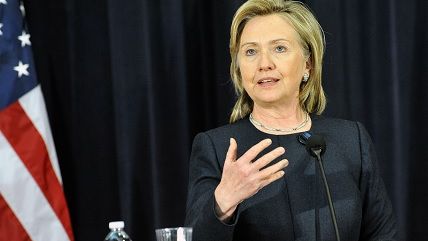Hillary Clinton's Endless Plan
From Alzheimer's to Epipens to youth unemployment.

Last week, in response to the uproar over the skyrocketing price for EpiPens, Hillary Clinton unveiled a plan to combat what she called "unjustified" and "outrageous" drug prices. By one tally, this makes the 7,439th plan Team Clinton has put together. Clinton is nothing if not thorough.
Thoroughness may be Clinton's greatest virtue, especially when juxtaposed with the colossally dangerous unreadiness of Donald Trump. You don't want a president confronting big issues de novo.
But it is also a significant vice. For one thing, coming up with your own plan to address an issue means you have to ignore all the other plans other people have come up with. That's one reason the federal government has 33 separate housing programs run by four different agencies.
Second, there's the problem of misdiagnosis. Clinton's plan for reining in drug prices entails creating a "dedicated group" of federal officials who would come up with new rules to decide which price hikes are unjustified, and then punish wayward companies with fines. Clinton also would arrange for "emergency importation" of drugs from abroad to combat price spikes, and so on.
All terribly unnecessary. The EpiPen's maker could get away with jacking up prices because the FDA has given it an effective monopoly. Several other companies have tried to bring similar epinephrine devices to market, but the FDA keeps shooting them down. In 29 states, it's illegal to substitute a generic version of the EpiPen, even if one were available. The EpiPen debacle is the product of too much regulation, not too little. Yet Clinton wants to add more rules.
But the biggest problem with having a plan for everything, as Clinton does, is the erroneous assumption that you should.
Clinton has a plan to address Alzheimer's disease. And another for autism. And animal welfare. And the cost of college. And the challenges facing rural America. And those confronting small business. And workforce training. And youth unemployment. And on and on and on.
It's easy to see why: Leave no potential constituency untapped. Hillary Clinton wants you to know she cares about the issue that matters most to you, good sir or madam, no matter what that might be, and she has a plan to address it.
In some cases her plans also make sense. (Simplifying federal taxes for small business is a good idea, for instance.) In other cases, it's fair to assume she is just checking off a box. President Clinton probably would not devote many Cabinet meetings to "cracking down on the practice of horse soring," no matter how inhumane the practice.
Trouble is, having a plan to address every issue under the sun implies the federal government generally, and the executive branch specifically, has both the authority and the responsibility to address every issue under the sun.
And that's not just false. It's dangerous.
It's false because, under our federal system, states and localities are supposed to maintain jurisdiction over many policy areas. The Constitution is quite clear on the point: "The powers not delegated to the United States by the Constitution, nor prohibited by it to the states, are reserved to the states respectively, or to the people." The list of powers delegated to the United States is not infinite. It is not even that long.
The implication is dangerous for a number of reasons. First, it robs the country of initiative. If the president is in charge of fixing everything wrong with America, then nobody else is, so all the rest of us need to do is sit around and wait until the administration takes care of things. (Don't sit on a hot stove while you do wait, though.)
It's also dangerous because it concentrates power. The executive branch already has amassed far more power than it should, thanks to unjustified deference from the judicial branch and irresponsible abdication by the legislative. Giving the executive branch even more power would further disrupt the country's system of checks and balances, and leave the nation in a precarious state. Imagine what someone like Donald Trump - or for that matter Hillary Clinton—could do with all the authority Clinton thinks the president ought to have.
Third, the assumption that the president should fix everything is dangerous because it erases every limit on government power. Clinton thinks the White House should decide what the acceptable price for a drug is - and impose it by fiat. If the president can do that, then what can't she do?
A president who can intervene with equal ease in the realm of drug pricing, animal welfare, workforce training, higher education and medical research is, to borrow from the Puritan preacher Jonathan Edwards, completely free to exercise his "sovereign pleasure, his arbitrary will, restrained by no obligation, hindered by no manner of difficulty."
Edwards, however, was talking about God.
This column originally appeared in the Richmond Times-Dispatch.


Show Comments (193)